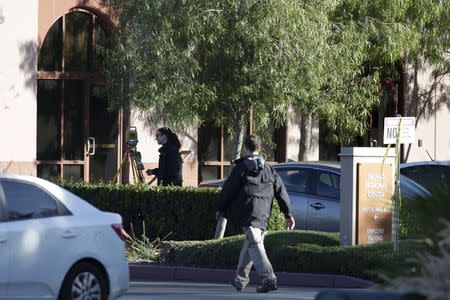FBI says California shooters were radicalised for 'some time'

By Dan Whitcomb SAN BERNARDINO, Calif. (Reuters) - Investigators believe the married couple who massacred 14 people in California last week - the U.S.-born husband and his Pakistani wife - had been radicalised "for some time," but no clues pointing to an international plot have yet emerged, the FBI said on Monday. Authorities also have evidence that Syed Rizwan Farook, 28, and his spouse, Tashfeen Malik, 29, had engaged in firearms target practise near their Southern California home, at least once within days of last week's deadly shooting rampage, according to the FBI. The latest disclosures in the FBI-led investigation came as San Bernardino County employees began returning to work under tighter security, five days after Farook, an environmental health inspector for the county, and his spouse opened fire with assault-style rifles on a holiday gathering of his colleagues. The couple were killed in a shootout with police several hours after their attack on Wednesday morning in a conference room at the Inland Regional Center social services agency in San Bernardino, about 60 miles (100 km) east of Los Angeles. The FBI said last week that authorities are investigating the mass shooting as an "act of terrorism," noting that Malik, a Pakistani native who lived most of her life in Saudi Arabia, was believed to have pledged allegiance on Facebook to the leader of the militant group Islamic State. If the mass shooting - the deadliest burst of U.S. gun violence in three years - proves to have been the work of people inspired by Islamic militants, it would mark the most lethal such attack in the United Sates since Sept. 11, 2001. In addition to five firearms recovered by investigators, law enforcement officers also have seized thousands of rounds of ammunition along with explosives and other materials for making as many as 19 pipe bombs. BOTH SUSPECTS BELIEVED RADICALISED 'FOR SOME TIME' Questions have been raised about the extent to which Farook, who was born in Illinois to Pakistani immigrant parents and grew up in Southern California, might have been acting under the influence of Malik, whom he married in Saudi Arabia in the summer of 2014 and then returned with to the United States But David Bowdich, assistant director of the Federal Bureau of Investigation's Los Angeles office, said on Monday that investigators believe "both subjects were radicalised and had been for some time." He said it remained to be seen whether they were indoctrinated by other individuals in the United States or elsewhere or whether they turned to extremist ideology on their own. Two U.S. government sources familiar with the case said on Monday that investigators had uncovered electronic communications indicating that the couple had at least tried to contact militants abroad, but those communications were believed to have been part of a self-radicalisation process. Addressing that aspect of the probe in a news conference on Monday, Bowdich said. "I want to be crystal clear here. We do not see any evidence so far of ... an outside-continental-U.S. plot. We may find it some day, we may not. We don't know." While the couple may have been inspired by Islamic State, U.S. government sources last week said there was no evidence their attack was directed by the militant group, or that the organisation even knew who they were. FBI Director James Comey said on Friday that no information had been uncovered suggesting the killers were part of an extremist cell or network. Bowdish said on Monday the FBI was working with its foreign counterparts to "build out" its investigation around the world. To date, he said authorities have conducted well over 400 interviews in Southern California and collected more than 320 individual pieces of evidence. The FBI, he said, was continuing to seek a motive for the attack. Agents believe the couple had been planning more violence because of their cache of ammunition and pipe bombs. One individual still being questioned was Farook's mother, who shared the couple's rented home in the town of Redlands, and in whose care the suspects left their 6-month-old daughter the morning of the shooting. Officials have said the infant has since been placed in protective custody. John D'Angelo, a special agent for the U.S. Bureau of Alcohol, Tobacco, Firearms and Explosives, confirmed that the two rifles used in the attack were purchased by an individual named Enrique Marquez, a reported longtime friend of Farook. But investigators were still trying to pin down how the two weapons were transferred to the shooters. The two handguns and a .22-caliber rifle recovered by investigators were bought by Farook himself. D'Angelo said all five guns were legally purchased by licensed gun dealers in California. (Writing by Steve Gorman; Additional reporting by Barbara Goldberg in New York; Editing by Bill Trott, Mary Milliken and Lisa Shumaker)

